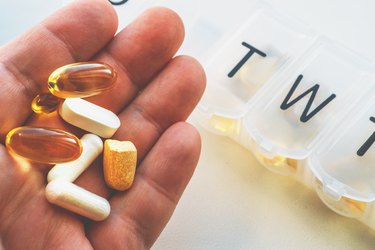
If you take herbal supplements to be sure you're getting all that your body needs to function at its best, it's possible that you could be putting your health at risk. Certain herbal supplements have been shown to raise blood pressure, according to the Mayo Clinic.
The Lowdown on High Blood Pressure
Video of the Day
Blood pressure is a measurement of the force of blood against the walls of your blood vessels. It's given as two numbers: systolic pressure, which is when blood is being pumped out of your heart and into your blood vessels, and diastolic pressure, which is when your heart is resting between beats, explains the American Heart Association (AHA). Readings are given as the number representing systolic pressure over the number for diastolic pressure.
Video of the Day
Normal blood pressure is an upper number of 120 or less and a lower number of less than 80, according to AHA. For blood pressure measurements that are above normal, there are four stages of increasing concern, ranging from "elevated" at 120-129 over less than 80, to "hypertensive crisis" at 180 or above over 120 or higher.
Nearly half of all adults in the U.S. have high blood pressure, and of those, one in four does not have this potentially dangerous condition under control, according to the Centers for Disease Control and Prevention (CDC).
Supplements and Blood Pressure
According to the Mayo Clinic, these herbal supplements may be linked to an increase in blood pressure:
Bitter orange (citrus aurantium). The fruit of bitter orange contains p-synephrine, a substance that is similar in structure to the stimulant ephedrine that used to be found in weight-loss medication, according to the National Center for Complementary and Integrative Health. The U.S. Food and Drug Administration has banned ephedra from dietary supplements since 2004 because it had been shown to raise blood pressure. Some manufacturers have replaced ephedra with bitter orange. Studies on whether bitter orange raises blood pressure are inconclusive, the center says.
Ma huang (ephedra). Used as a stimulant for weight loss and to suppress appetite, Ma huang is sold under a number of different names: sea ephedrine, ephedra, ephedra alkaloids, yellow astringent, sea grape, yellow horse, squaw tea, Mormon tea, popotillo, teamster's tea and joint fir, according to the America College of Cardiology. Among its many possible side effects is an increase in blood pressure. Ma huang is not recommended for people with heart and blood pressure conditions.
Ginseng (Panax quinquefolius, Panax ginseng). Ginseng is sold as a dietary supplement to improve your general well-being, to slow aging and to alleviate health problems including heart and vascular diseases, according to the National Center for Complementary and Integrative Health. It's not clear whether ginseng raises or lowers blood pressure, but it's best to use caution either way, according to the Mayo Clinic.
Licorice (Glycyrrhiza glabra). If you're older than 40 and have a history of high blood pressure, the British Heart Foundation says that consuming black licorice, which is available as a supplement, could cause problems if you take it daily in moderate amounts. That's because Glycyrrhizin, a compound found in licorice root, can affect the level of potassium and sodium in your body. Too much Glycyrrhizin can cause you to retain fluid and raise your blood pressure, the foundation says.
Vitamins and Blood Pressure
"Vitamins don't seem to have much of an effect on blood pressure," says Jo Ann Carson, PhD, RD, a retired professor of clinical nutrition at the University of Texas Southwestern Medical Center and former chair of the nutrition committee of the American Heart Association.
Studies to date aren't conclusive enough to recommend vitamin supplements as a way to either raise or lower blood pressure, she says.
A study published in the July 2019 Journal of Human Hypertension found that vitamin E actually decreased systolic blood pressure, but it had no effect either way on diastolic blood pressure. The Mayo Clinic says that lack of vitamin D may cause high blood pressure, but whether taking the vitamin is helpful or harmful isn't clear.
An Important Warning
Vitamins and herbal supplements can interfere with medications that you may have been prescribed for high blood pressure, Carson says, so this makes it important to "tell your doctor before you start taking them."
- Mayo Clinic: “Medications and Supplements That Can Raise Your Blood Pressure”
- American Heart Association: “What Is High Blood Pressure?”
- Centers for Disease Control and Prevention: “Facts About Hypertension”
- National Center for Complementary and Integrative Health: “Bitter Orange”
- American College of Cardiology: “Ma Hong (Ephedra)”
- National Center for Complementary and Integrative Health: “Asian Ginseng”
- British Heart Foundation: “Could Eating Licorice Affect My Blood Pressure?”
- Journal of Human Hypertension: “Effect of Vitamin E Supplementation on Blood Pressure: a Systematic Review and Meta-analysis”
- Mayo Clinic: “Can Low Vitamin D Cause High Blood Pressure?”
- Mayo Clinic: “Supplements to Avoid When Dealing With High Blood Pressure”
Is this an emergency? If you are experiencing serious medical symptoms, please see the National Library of Medicine’s list of signs you need emergency medical attention or call 911.